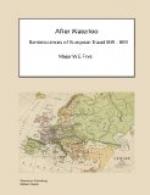The next place I went to see was the Lyceum or University, where there is a very fair cabinet of natural history in all its branches. The Library is very remarkable, and possesses a great number of valuable manuscripts. But my principal object in visiting this Museum was to see the monument erected in honour of Ariosto, which has been transferred here from the Benedictine church. The inkstand and chair of this illustrious bard are carefully preserved and exhibited. They exactly resemble the print of them that accompanies the first edition of Hoole’s translation of the Orlando Furioso. Among the manuscripts what gratified me most was the manuscript of the Gerusalemme liberata of Tasso. But few corrections appear in this manuscript; tho from the extreme polish and harmony of the versification one would expect a great many. It is written in an extremely legible hand.
I also inspected the original manuscripts of the Pastor Fido of Guarini and of the Suppositi of Ariosto.
I then went to visit the Hospital of St Anna, for the sake of seeing the dungeon where poor Tasso was confined and treated as mad for several years. When one beholds this wretched place, where a man can scarce stand upright, one only wonders how he could survive such treatment; or how he could escape becoming insane altogether. The old wooden door of this cell will soon be entirely cut away by amateurs, as almost everyone who visits the dungeon chops off a piece of wood from the door to keep as a relic. The door is in consequence pieced and repaired with new wood, and in a short time will be in the state of Sir John Cutter’s worsted stockings which were darned so often with silk that they became finally all silk.
Ferrara has a strong citadel which is still garrisoned by Austrian troops; and they will probably not easily be induced to evacuate it. The Austrian Eagle seldom looses his hold.
VENICE, 18th May.
On the 16th May at six o’clock in the morning I left Ferrara in a cabriolet to go to the Ponte di Lago oscuro, which is a large village on the south bank of the Po, three miles distant from Ferrara. A flying bridge wafted me across the river, which is exceedingly broad and rapid to the north bank, where a barge was in waiting to receive passengers for Venice. This barge is well fitted up and supplied with comestibles of all sorts and couches to recline on. The price is twelve francs for the passage, and you pay extra for refreshments. The bark got under weigh at seven o’clock and descended rapidly this majestic river, which however, from its great breadth, and from the country on each side of it being perfectly flat, did not offer any interesting points of view. Plains and cattle grazing thereon were the only objects, for they take care to build the farms and houses at a considerable distance from the banks, on account of the inundations. After having descended the Po for a considerable distance,




